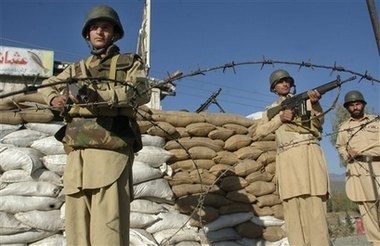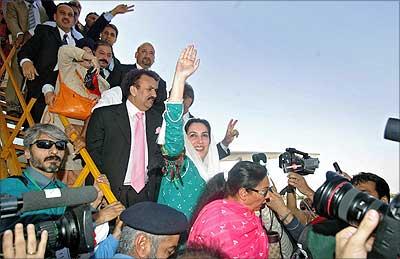 It appears that the regime is not altogether pleased with Benazir Bhutto now that she has returned.
It appears that the regime is not altogether pleased with Benazir Bhutto now that she has returned.The huge crowds gathered to receive her unnerved Musharraf and his stalwarts (most, if not all, of whom are in office by virtue of the cooked elections of 2002). Secondly, Benazir Bhutto has publicly hurled charges against some of Musharraf’s ‘nearest and dearest’ for planning the bomb that savaged her motorcade on 18th October killing and maiming hundreds of people.
So now the government has not only announced that the National Reconciliation Ordinance would not apply to cases pending against Benazir Bhutto in foreign courts but also that the government would provide necessary evidence and witnesses if sought by any foreign court.
Obviously the deal has suddenly been consigned to the rubbish heap and the gloves have come off.
Let us see if Bhutto crumbles or fights.
_______________________________________
The BCC recently provided a synopsis of the foreign cases currently pending against the PPP leader.
FOREIGN CASES THAT COULD HAUNT BHUTTO
By Richard Lawson
BBC News, London
Former Pakistani Prime Minister Benazir Bhutto is preparing for general elections shortly after returning to the country after years of self-imposed exile.
She came back after President Pervez Musharraf granted her a controversial amnesty from the charges in Pakistan.
The Supreme Court may yet rule that amnesty illegal. But even if it clears it, Ms Bhutto, who has been in talks about a power-sharing deal with President Musharraf, could still face several cases outside of Pakistan.
One of the most advanced is in Switzerland, where in 2003 Geneva magistrate Daniel Devaud convicted Ms Bhutto of money-laundering.
In his judgment, he found she and her close associates received around $15m in kickbacks from Pakistani government contracts with SGS and Cotecna, two Swiss companies.
Mr Devaud sentenced Ms Bhutto and her husband Asif Zardari to 180 days in prison, ordering them to return $11.9m to the government of Pakistan.
"I certainly don't have any doubts about the judgments I handed down [which] came after an investigation lasting several years, involving thousands of documents," he has told the BBC.
Ms Bhutto contested the decision, which was made in her absence, and the case is being reheard, with the former prime minister now facing the more serious charge of aggravated money-laundering.
Not automatic
Asked about the case, her officials told the BBC: "These allegations are part and parcel of a campaign of a character assassination. Ms Bhutto has not done anything illegal. She and her husband, Senator Asif Zardari, both have defended themselves in every court in every country."
Many in Pakistan assume the Swiss case will now collapse because of the deal struck between Ms Bhutto and President Musharraf.
Yet under Swiss law, even if the government of Pakistan stops co-operating, that would not automatically end legal proceedings in Switzerland.
Vincent Fournier, the Swiss judge in charge of the current case, told the BBC he planned to hand the case over to Geneva's attorney-general this week.
A second international case involving Ms Bhutto is under way in England.
In this case, the government of Pakistan alleged that Ms Bhutto and her husband bought Rockwood, a $3.4m country estate in Surrey, using money from kickbacks.
Ms Bhutto and Mr Zardari denied owning the estate for eight years. But in 2004, Mr Zardari suddenly admitted that it was his.
Then, in 2006, an English judge, Lord Justice Collins, came to an interesting, though by no means final, conclusion about the estate.
Whilst stressing he was not making any "findings of fact", Justice Collins said there was a "reasonable prospect" of the government of Pakistan establishing, in possible future court proceedings, that Ms Bhutto and/or her husband bought and refurbished Rockwood with "the fruits of corruption".
Asked by the BBC about Rockwood, Ms Bhutto's officials denied any allegations of corruption, but gave no detailed response, although her husband's lawyers told Justice Collins that Pakistan's case was speculative.
The London case is a civil one. That means it could collapse should President Musharraf's government decide not to pursue it.
Iraq questions
Ms Bhutto also faces allegations concerning the United Nations oil-for-food scandal.
In 2005, the Independent Inquiry Commission led by former US Federal Reserve head Paul Volcker found that more than 2,000 companies breached UN sanctions by making illegal payments to Saddam Hussein's government in Iraq before 2003.
Among them was a company called Petroline FZC, based in the United Arab Emirates. Mr Volcker's inquiry found it traded $144m of Iraqi oil, and made $2m of illegal payments to Saddam Hussein's regime.
Documents from Pakistan's National Accountability Bureau appear to show that Ms Bhutto was Petroline FZC's chairwoman.
If these documents are genuine, and the oil-for-food allegations are proven, this would be especially damaging for the former prime minister.
The Spanish authorities are investigating financial transactions thought to be linked to Petroline FZC. In addition, President Musharraf's amnesty dropping corruption charges against public officials only covers the period 1986-1999.
The Petroline FZC transactions came after that, which means that in theory a charge is possible.
Ms Bhutto has always denied all corruption allegations, and her supporters say the allegations against her are politically motivated.
But her legal difficulties may not be over yet.












